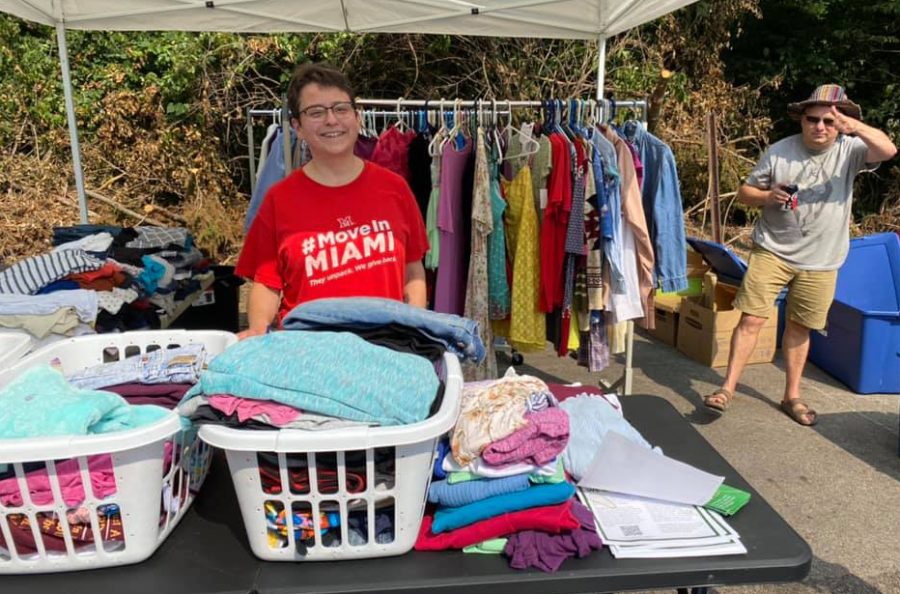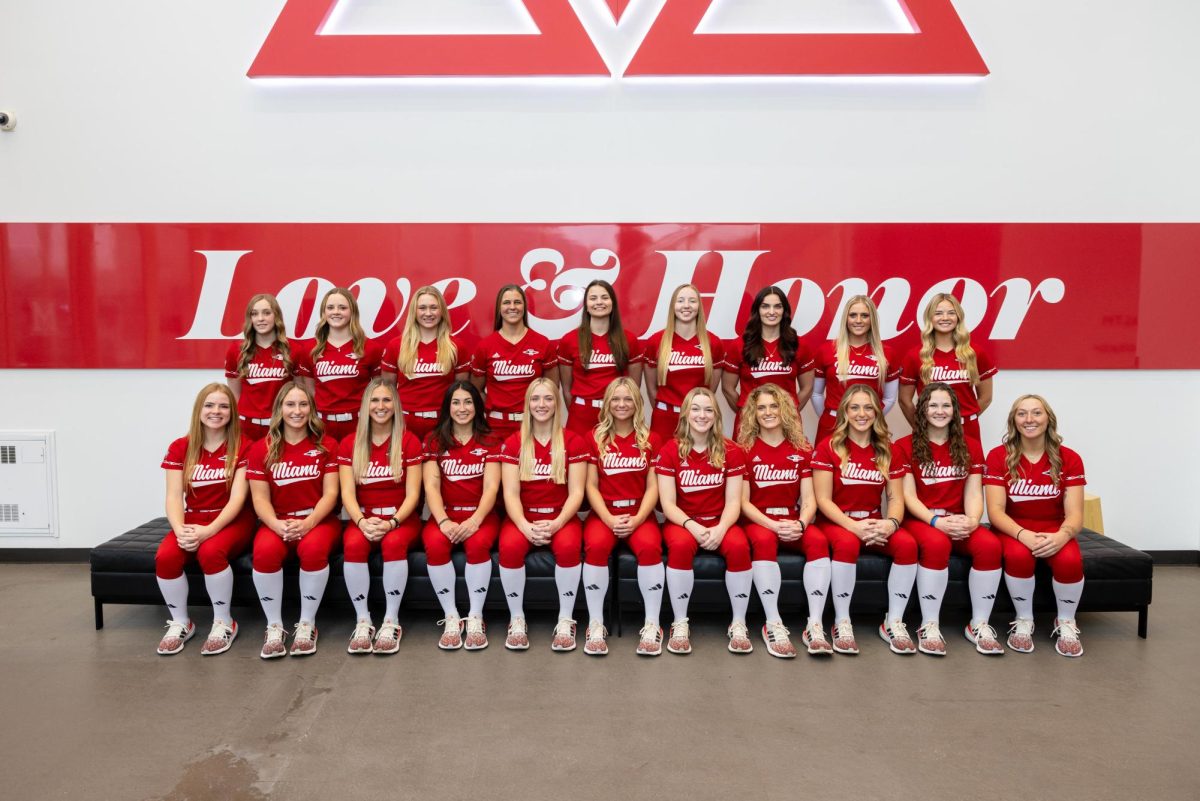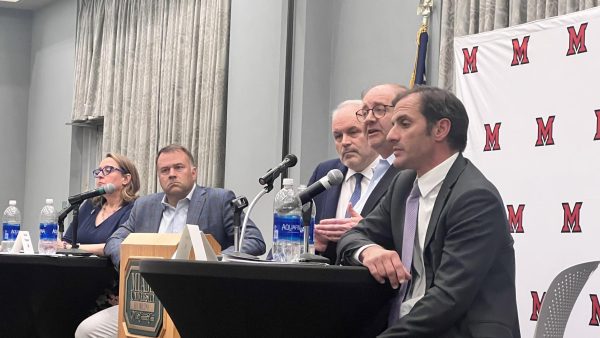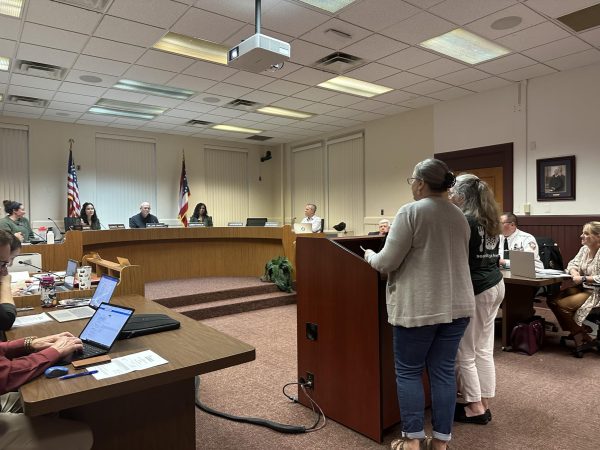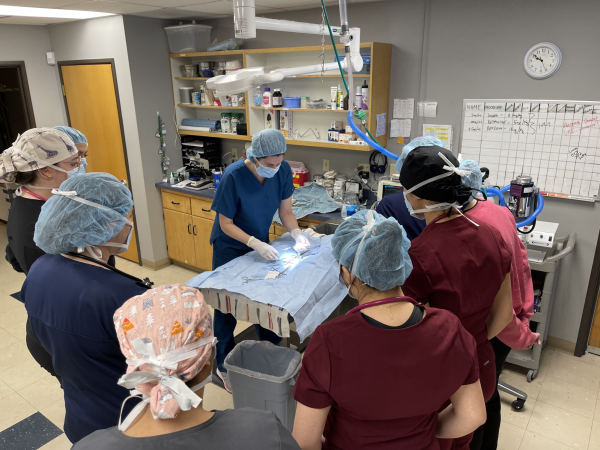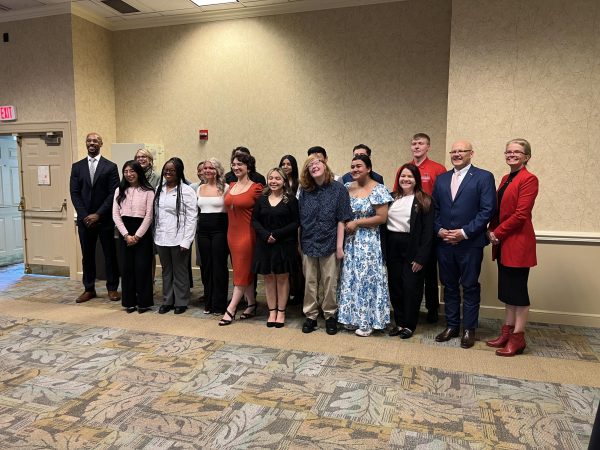Organizations work toward recycling clothing
Photo provided by Thread Up Oxford
Volunteers Emilie Davis (red shirt) and Bob Black, at a Thread Up Oxford collection event earlier this year.
November 24, 2021
The next time you’re looking for a nice outfit, turn to your closet before heading to your favorite retail store, says Rebecca Robinson, Miami University visiting assistant professor in the Fashion Department.
Fast fashion, a process that allows a retailer to produce a lot of garments very frequently, speeding up production, retail and consumption of clothing, is wreaking economic and environmental havoc on developing countries like Ghana, according to an October report on Public Radio International.
“It’s really about buying less,” Robinson said. “Fast fashion is all about volume and evaluating what you really need.”
Efforts to mitigate the negative effects of the fast fashion industry have been popping up around Oxford recently.
Shana Rosenberg started Thread Up Oxford, a donation group with an initiative to educate and reduce textile waste in the community.
“It’s just always bothered me to see fabrics thrown out,” Rosenberg said. “I started doing the research a few years ago and things came together to start the group this year.”
When Americans and other western countries are through with clothing, it is typically “donated” or exported to developing countries for resale, the article said. In Ghana, residents will purchase the used clothing in large bundles, pick out the usable items and resell them at markets.
However, due to the nature of fast fashion, the amount of clothing being sent is doing more harm than good. Sellers are expected to sell more pieces for less money, dipping into the main source of income for many families and individuals. The countries are then responsible for disposing of the excess clothing, too. This is forcing overfilled landfills to close and people to dispose of the clothes illegally or on beaches where they end up in the ocean, according to the PRI report.
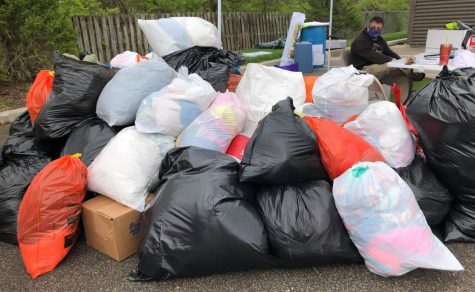
Since starting earlier this year, Thread Up Oxford has prevented roughly 1,000 pounds of textiles from going to the landfill or being sent overseas each month, Rosenberg said.
According to the Dropmint laundry service, a commercial, online, next-day laundry service in San Diego, the average outfit weighs between one and a half and three pounds. This means Oxford residents are getting rid of roughly 300 outfits every single month to Thread-Up Oxford. That’s enough clothing to wear a different outfit every weekday for over a year.
This doesn’t begin to account for the clothing sent to other donation centers, landfills and overseas.
“We’ve become like a mini clothes closet for the community,” Rosenberg said. “When we get clothing donations, we make sure it’s high quality to be donated to places like the Talawanda School District, the Family Resource Center and directly through community members.”
Other textiles like old towels and sheets are sent to vet and animal clinics. While sewing materials are given to community members for personal use or to be further distributed.
Almost all of the textiles donated to Thread Up Oxford are used, but about 10% are deemed unusable and sent to Goodwill for recycling, said Rosenberg.
According to the Goodwill website, donated textiles that don’t sell in the store are sent to outlet stores where the clothing is sold by the pound. If the clothing doesn’t sell at the outlet, Goodwill sells them to textile recyclers who turn it into things like rags and insulation.
People buy and throw out clothing so quickly for a number of reasons, ranging from the advent of the shopping mall to cheap prices and influencer culture. All this is resulting in a number of environmental hazards.
According to the United Nations Environmental Program, textile dyeing is the second highest water pollutant and is responsible for 2-8% of carbon emissions globally.
Robinson explained attitudes regarding shopping changed in the 1980s with the shopping mall, when “window shopping” and buying clothes became a leisure activity.
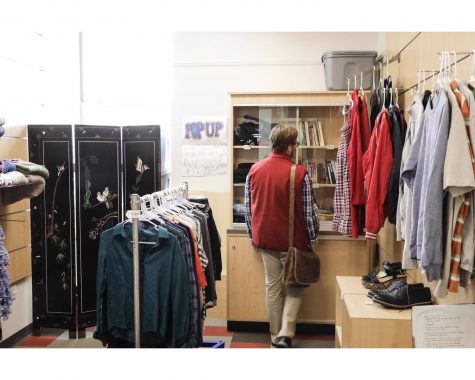
Today, those attitudes have shifted toward the digital landscape, where cheap clothing, often from overseas companies, makes it easy for consumers to rationalize buying clothes they may only wear a few times.
“Now with social media and all the influencers, people are constantly bombarded with imagery creating desire,” Robinson said.
Aside from donating used clothing and getting it recycled, Robinson offered a number of other ways people can reduce their textile waste.
When buying some new pieces is necessary, consumers should aim to shop second-hand or buy sustainable brands. Other recommendations include buying quality pieces and learning how to properly wash and care for garments to extend their life. She also recommends learning some basic alteration skills to mend clothing that might be missing a button or have a small tear.
Miami students are working toward the reduction of textile waste within the campus community.
In October, Zero Waste Oxford, a student organization committed to reducing waste, hosted its Pop-Up Thrift Shop. The shop, hosted for a week each semester since the Spring of 2019, encourages students to shop secondhand while simultaneously spreading awareness about the issues within the fast fashion industry, said Cassie Conrad, the club’s president.
“Not everyone knows how accessible thrifting is or that you can find “good” clothes thrifting,” Conrad said.
Thrifting, or the act of purchasing clothing from a secondhand store, is one of the best ways to buy clothing when needed, according to Robinson.
The pop-up shop encourages students and community members to donate clothes year-round at Miami’s Western Center in Peabody Hall, to keep the textiles out of the landfill or from being sent overseas.
Those who donate are then awarded store credit and get a few free items when the shop is up and running.
“I don’t think Miami is worse than any other university, I just don’t think students know about their donation options,” Conrad said.
Watch for Zero Waste Oxford’s next pop-up store dates on the organization’s events page.


